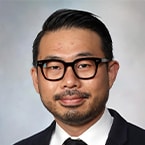AACR Innovation and Discovery Grant
The AACR Innovation and Discovery Grant seeks to encourage innovation and translation of ideas from basic research into new treatment options for cancer.
2024 grantee

Research
Dr. Hwang’s research focuses on enhancing the efficacy of immune checkpoint inhibitors (ICIs) in gastric cancer (GC) through AI-driven spatial analysis of the tumor microenvironment (TME). Dr. Hwang proposes to identify biomarkers predictive of ICI response and discover actionable targets for improving treatment outcomes. Using AI algorithms to analyze multimodal spatial omics data, Dr. Hwang’s team will investigate the spatial heterogeneity and phenotypes of tumor, stroma, immune, and other types of cells in the TME. This research could pave the way for personalized ICI therapy in GC and potentially improve the clinical benefit for patients.
Biography
Dr. Hwang is a researcher specializing in the application of AI in oncology. He earned his doctorate in Computer Science from the University of Minnesota Twin-Cities after which he began his career at Genentech. He later held a faculty position at the University of Texas Southwestern Medical Center, before joining the Cleveland Clinic in 2016. He currently serves as an endowed cancer chair at the Mayo Clinic, where he leads the AI in Oncology program. His interdisciplinary lab combines experimental techniques with AI methodologies to enhance the understanding and treatment of gastric cancer. He and his team are dedicated to advancing the fields of predictive biomarkers and immunotherapy for this disease.
Acknowledgment of Support
“The 2024 AACR Innovation and Discovery Grant is crucial for advancing my research in developing AI-driven biomarkers for predicting immune checkpoint inhibitor responses in gastric cancer. This support will significantly accelerate our efforts to improve patient outcomes and personalize cancer therapy.”